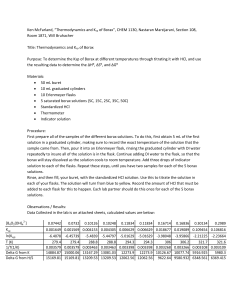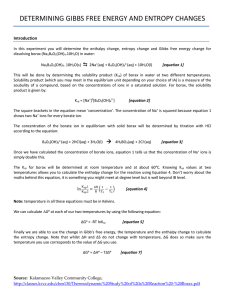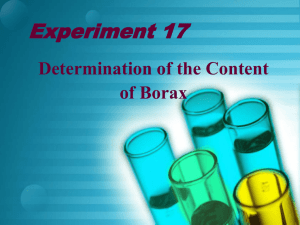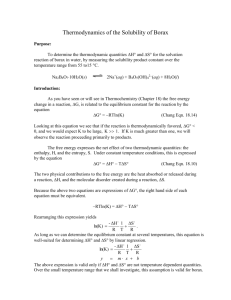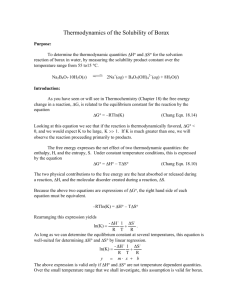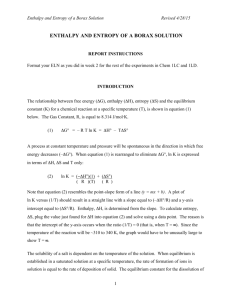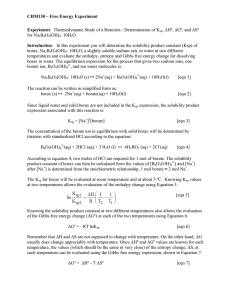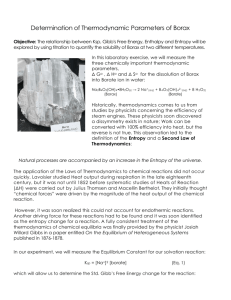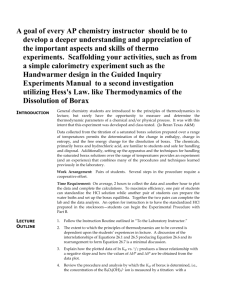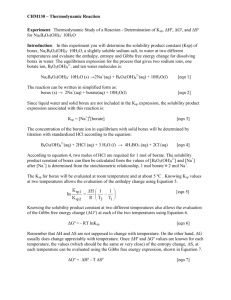Determination of K, ΔG˚, ΔH˚, and ΔS˚ Borax Na 2 B 4 O 7
advertisement
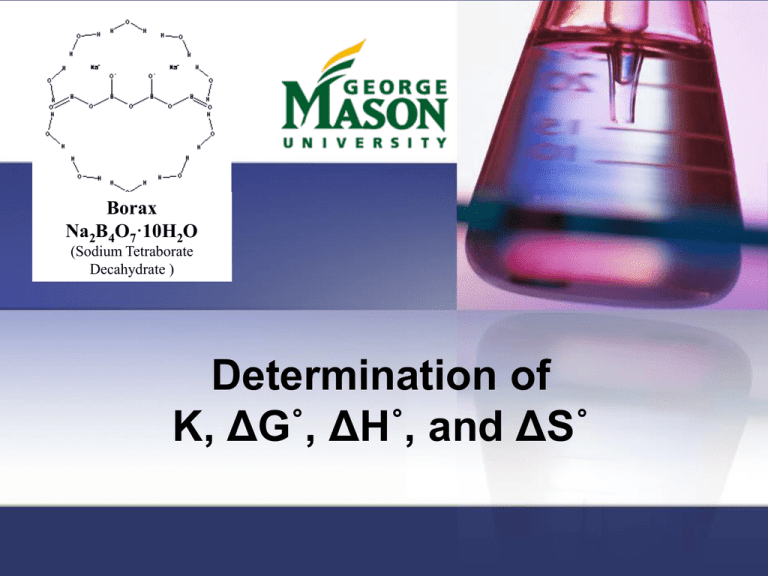
Borax Na2B4O7·10H2O (Sodium Tetraborate Decahydrate ) Determination of K, ΔG˚, ΔH˚, and ΔS˚ Borax Equilibrium 2 Na2 B4O7 10H 2O(s) 2 Na (aq) B4O5 (OH ) 4 (aq) 8H 2O(l ) Na B O (OH ) H O K 2 2 4 5 8 4 Na2 B4O7 10H 2O 2 K Na B O (OH ) H O 2 2 4 K sp Na 5 8 4 2 B O (OH ) 2 2 4 5 4 Let’s Simplify!! Stoichiometry tells us that for each Na2+ there are two B4O5(OH)42-: Na 2B O (OH ) 2 4 4 B O (OH ) K sp Na 5 2 2 4 K sp 2 B4 O5 (OH ) 4 2 5 4 B O (OH ) 2 2 4 K sp 4 B4O5 (OH ) 4 5 2 3 4 Today’s Rxn Actual reaction for today: 2 B4O5 (OH ) 4 (aq) 2HCl 3H 2O 4B(OH ) 3 (aq) 2Cl The borate ion titrated with HCl yields the above. Calculate moles borate ion to get Ksp. Gibbs Free Energy (ΔG), Enthalpy (ΔH), and Entropy (ΔS) Once you have Ksp, determine the Gibbs free energy: G RT ln K sp G H TS RT ln K sp H TS Rearrange to a linear form (so you can compare with a graph) by dividing both sides by (-RT) ln K sp H TS RT RT and T cancels out ln K sp y H R 1 S T R = m x + b Changes in Procedure Each group does one temp (assigned). 3 trials. Add 2 scoops of borax and 75 mL of distilled water to a beaker Heat the solution (<50 °C) so that the solution is saturated. Heat slowly! No need to speed up the heating process. Once slightly above assigned temperature, take off hotplate. If all the solid has dissolved, add some more borax to beaker. Pour 5 mL of the solution into a graduated cylinder once the solution is at the desired temperature. Record volume to tenths place. Be sure to record temperature to the tenths place. Procedure (continued) Add the 5 mL of solution to an Erlenmeyer with 50 mL distilled water, 5 drops bromocresol green, mix thoroughly, add a little distilled water to rinse the graduated cylinder into the Erlenmeyer (Quantitative Transfer) Titrate with HCl (clean/rinse buret and fill w/ ~20 mL HCl) REPEAT! The above steps for two more titrations. DO NOT try to prepare three samples at once, unless you can guarantee the temperature of the borax solution will not change dramatically! Formal Lab Report Table, Figure, and calculations (pg. 6 in Handout) Address and discuss topics in handout (pg. 6)


